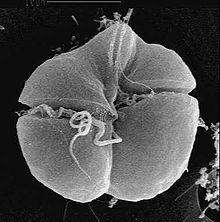凯伦藻属
凯伦藻科的一属藻类
(重定向自Karenia)
| 凯伦藻属 | |
|---|---|

| |
| 短凯伦藻 Karenia brevis | |
| 科学分类 | |
| 演化支: | SAR 超类群 SAR |
| 演化支: | 囊泡虫类 Alveolata |
| 总纲: | 双鞭毛虫门 Dinoflagellata |
| 纲: | 横裂甲藻纲 Dinophyceae |
| 目: | 裸甲藻目 Gymnodiniales |
| 科: | 短甲藻科 Brachidiniaceae |
| 属: | 凯伦藻属 Karenia G.Hansen & Moestrup, 2000 |
| 种 | |
|
见正文 | |
物种
编辑本属包括以下物种:[1]
- Karenia aureola Hulbert
- 短凯伦藻 Karenia brevis (C.C.Davis) G.Hansen & Ø.Moestrup, 2000[2]
- Karenia brevisulcata (F.H.Chang, 1999) G.Hansen & Moestrup, 2000
- Karenia concordia [3]
- 指状凯伦藻 Karenia digitata Yang & Takayama, 2000[4]
- Karenia hui [5]
- 长沟凯伦藻 Karenia longicanalis Yang & Hodgkiss,2001
- 米氏凯伦藻 Karenia mikimotoi (Miyake et Kominami ex Oda G. Hansen et Moestrup, 2000)
- Karenia papilionacea A.J.Haywood & K.A.Steidinger, 2004
- Karenia selliformis
- Karenia umbella de Salas, Bolch & Hallegraeff, 2004[6]
参考文献
编辑- ^ Karenia G.Hansen & Moestrup, 2000. GBIF. [2023-09-25]. (原始内容存档于2022-01-19).
- ^ Lidie K B , Dolah F . Spliced Leader RNA-Mediated trans-Splicing in a Dinoflagellate, Karenia brevis[J]. Journal of Eukaryotic Microbiology, 2007, 54(5):427-435.
- ^ F. Hoe Chang & Ken G. Ryan (2004) Karenia concordia sp. nov. (Gymnodiniales, Dinophyceae), a new nonthecate dinoflagellate isolated from the New Zealand northeast coast during the 2002 harmful algal bloom events, Phycologia, 43:5, 552-562, DOI: 10.2216/i0031-8884-43-5-552.1
- ^ Zhen B. Yang, Haruyoshi Takayama, Kazumi Matsuoka & I. J. Hodgkiss (2000) Karenia digitata sp. nov. (Gymnodiniales, Dinophyceae), a new harmful algal bloom species from the coastal waters of west Japan and Hong Kong, Phycologia, 39:6, 463-470, DOI: 10.2216/i0031-8884-39-6-463.1
- ^ Five Karenia species along the Chinese coast: with the description of a new species, Karenia hui sp. nov. (Kareniaceae, Dinophyta). Sciencedirect. [2024-05-22]. (原始内容存档于2024-05-22).
- ^ Miguel F. de Salas, Christopher J. S. Bolch & Gustaaf M. Hallegraeff (2004) Karenia umbella sp. nov. (Gymnodiniales, Dinophyceae), a new potentially ichthyotoxic dinoflagellate species from Tasmania, Australia, Phycologia, 43:2, 166-175, DOI: 10.2216/i0031-8884-43-2-166.1